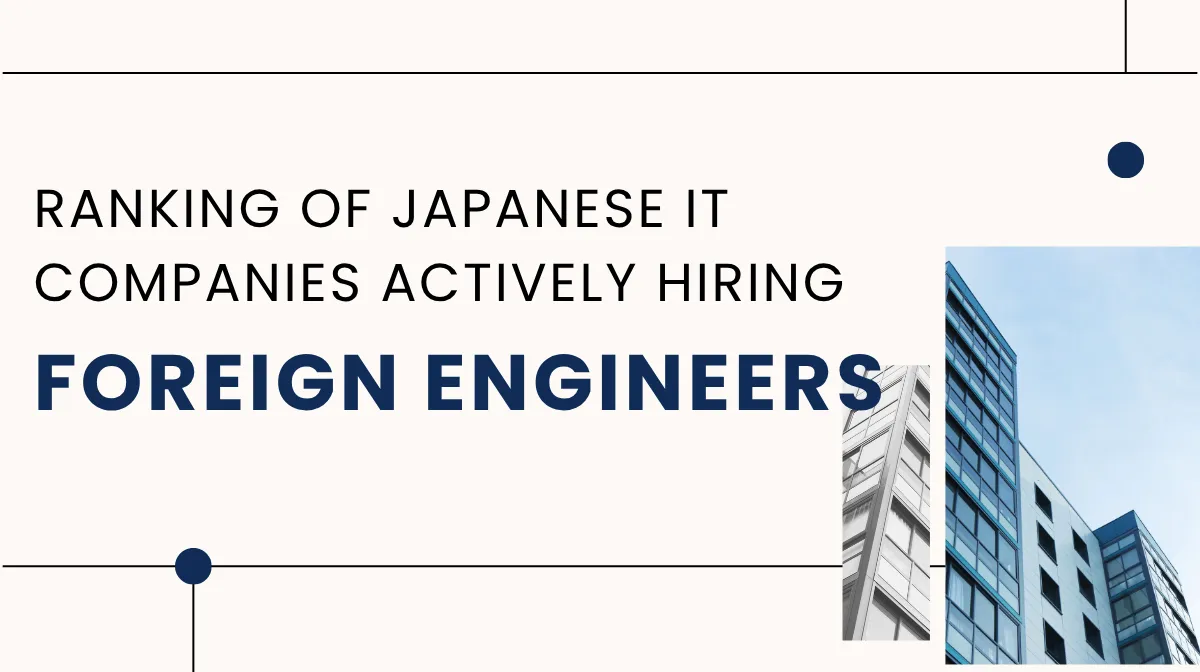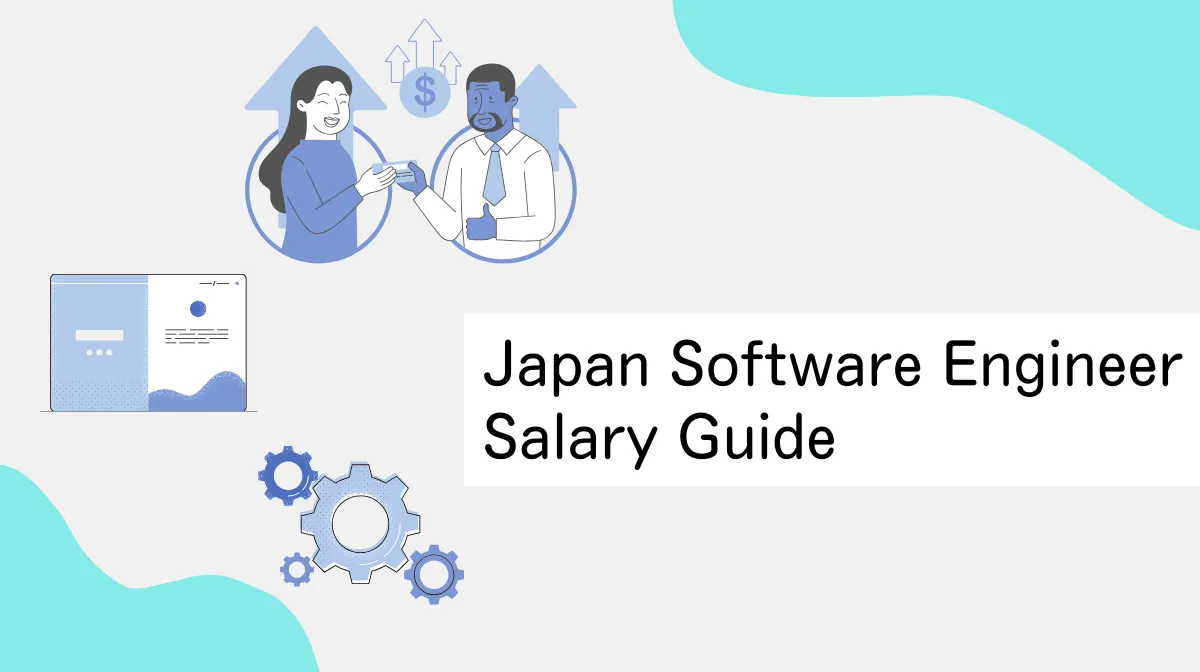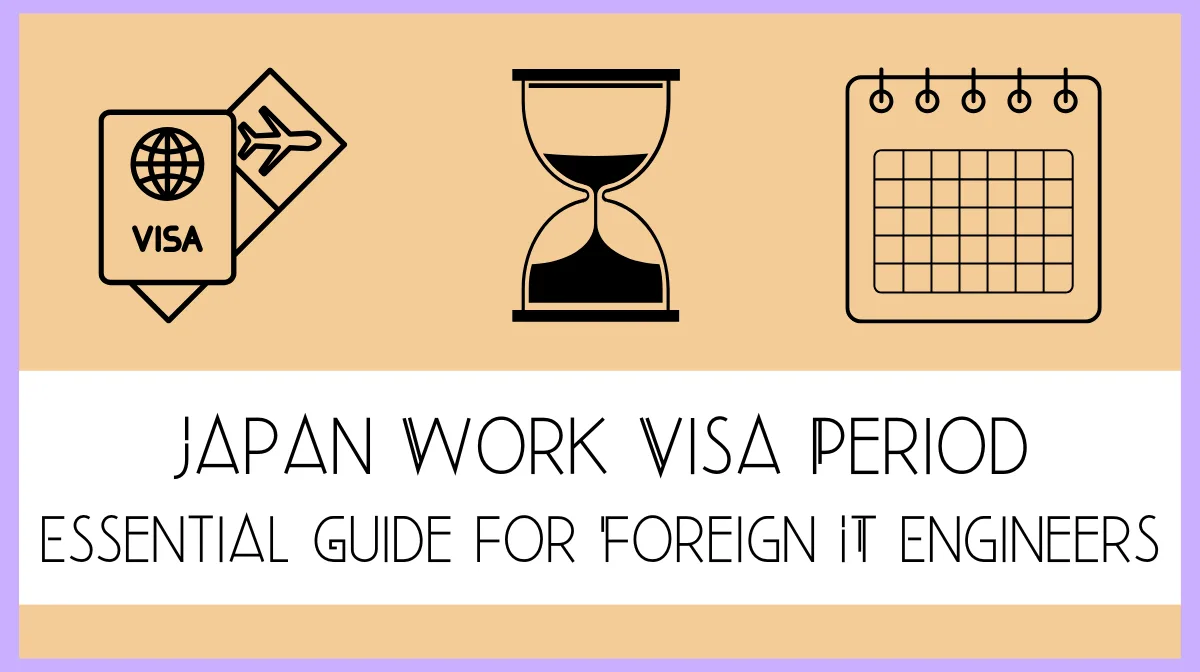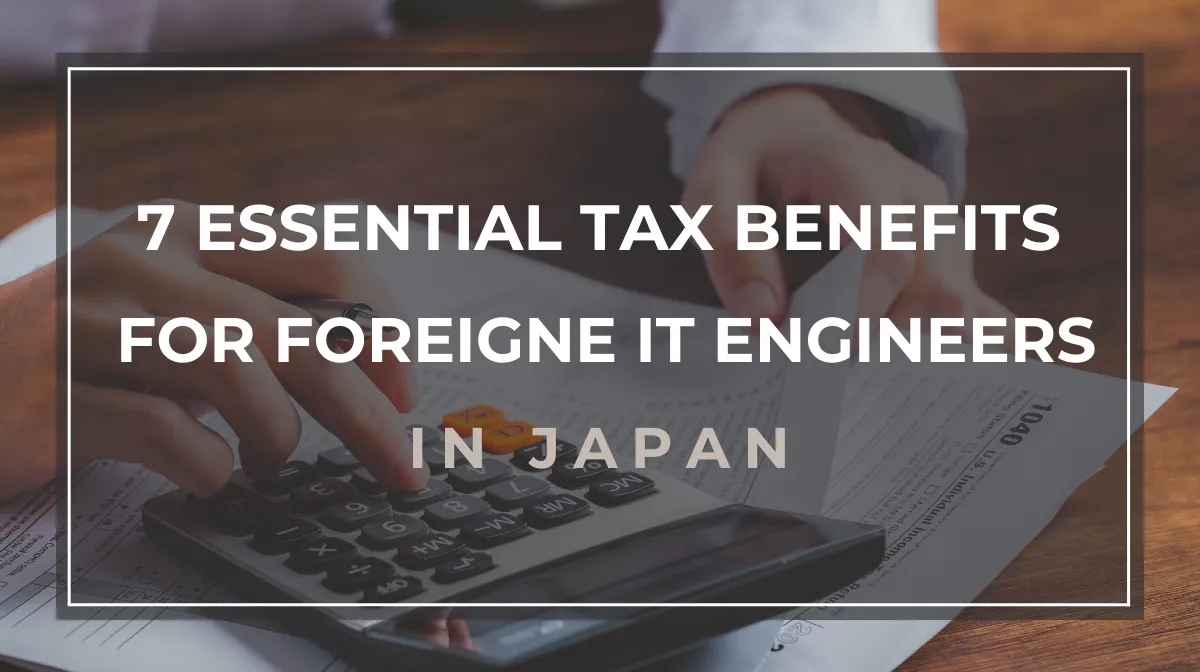Japan’s IT industry is facing a severe talent shortage and is increasingly proactive in hiring foreign engineers.
However, gathering information about which companies offer good working environments, adequate salaries, and visa support is not easy.
This article introduces companies from various perspectives in ranking format based on evaluations from foreign IT engineers, supporting career development in Japan.
- Top Japanese IT companies actively hiring foreign engineers with salary and visa support details.
- Best work locations in Japan for foreign engineers, from Tokyo to regional cities.
- Career success strategies and real stories from foreign engineers in Japan’s IT industry.
1. Japanese Job Market Guide for Foreign Engineers

Japan’s IT industry is currently facing a severe talent shortage. According to a survey by the Ministry of Economy, Trade and Industry, approximately 450,000 IT professionals are predicted to be in short supply by 2030.
Against this backdrop, many Japanese companies are strengthening their stance toward actively accepting talented personnel from overseas.
For foreign engineers, Japan has become an attractive employment destination where they can experience high technical standards, a safe living environment, and unique business culture.
The Japanese government is also preparing to accept foreign IT talent by easing requirements for highly skilled professional visas and expanding residence status categories.
Reference: Ministry of Economy, Trade and Industry: About the IT Field(Japanese)
Why Demand for Foreign Engineers is Growing in Japan’s IT Industry
There are several reasons why demand for foreign engineers is growing in Japan’s IT industry.
First, the declining working-age population due to an aging society with a low birth rate can be cited. Japan’s working-age population is decreasing year by year, making talent acquisition particularly difficult in the IT industry.
Additionally, while the promotion of Digital Transformation (DX) has led to a sharp increase in demand for system development and operations, domestic engineer supply has not kept pace.
For Japanese companies expanding globally, foreign engineers with multilingual capabilities and global perspectives have become valuable assets.
Engineers with skills in English, Chinese, Vietnamese, and other languages are particularly valued in overseas market-oriented product development and international projects.
Reference: Ministry of Economy, Trade and Industry
Benefits for Foreign IT Engineers Choosing Japanese Companies
The benefits for foreign IT engineers choosing Japanese companies are diverse.
- Many Japanese companies offer stable employment environments. Compared to Western tech companies, Japanese companies have fewer layoffs and enable long-term career development. Japan’s social security systems, including health insurance and pensions, are also well-developed, providing peace of mind in daily life.
- Opportunities to learn Japan’s unique technologies and business practices. Japan’s manufacturing spirit, quality control methods, and teamwork-oriented culture help expand skill sets as an engineer.
- High quality of life. Japan’s life infrastructure, including developed public transportation, good security, and excellent medical services, is outstanding even by global standards. There are also many elements that enrich daily life, such as beautiful nature through the four seasons and rich food culture.
- As career advancement opportunities, work experience in Japan is often highly valued internationally and helps build global career paths. In particular, acquiring Japanese language skills expands career opportunities in Asian markets.
For these and other reasons, many foreign IT engineers choose employment in Japan.
The next chapter introduces Japanese IT companies that are active in hiring foreign talent in ranking format.
2. Ranking of Japanese IT Companies Actively Hiring Foreign Engineers

In Japan’s IT industry, companies that are actively hiring foreign engineers are increasing as they aim to improve technical capabilities and expand globally.
Here, we introduce companies in ranking format considering factors such as the number of foreign engineers hired. (*This ranking was independently created by comprehensively considering companies’ public information, hiring track records, and evaluations from foreign engineers)
Top 10 Companies by Number of Foreign Engineers Hired and Their Characteristics
| Rank | Company Name | Main Hiring Countries/Regions | Features/Strengths |
|---|---|---|---|
| 1 | Rakuten Group, Inc. | India, China, USA, European countries | English as official language, active global recruitment, multinational team composition |
| 2 | Mercari, Inc. | USA, Canada, India, China, Southeast Asia | Startup culture, flexible working style, English environment |
| 3 | LY Corporation | South Korea, Taiwan, Thailand, Indonesia | Strong in Asian markets, multilingual service development |
| 4 | CyberAgent, Inc. | China, South Korea, Southeast Asia | Well-developed internship programs, active startup support |
| 5 | SoftBank Group Corp. | India, China, USA, Europe | Global business expansion, AI and next-generation communication technology development |
| 6 | NTT Data Group Corporation | India, China, Southeast Asia, Europe | Numerous global projects, strengthened coordination with overseas bases |
| 7 | Fast Retailing Co., Ltd. | China, South Korea, Europe, Southeast Asia | Strengthening digital strategy, focus on global retail tech |
| 8 | Cybozu Inc. | China, Vietnam, Thailand | Promoting remote work, flexible working style, emphasis on work-life balance |
| 9 | Fujitsu Limited | India, China, Europe | Long-term technology development, stable work environment, strong in R&D |
| 10 | Sony Group Corporation | USA, Europe, India, China | Innovation-focused, globally active environment |
Characteristics of Top 3 Companies
These companies are not only hiring large numbers of foreign personnel but also share a commitment to respecting diverse cultures and ways of thinking, creating environments where foreign engineers can maximize their abilities.
When considering options, it’s important to choose companies that match your career goals and preferred working style, not just hiring numbers.
Rakuten Group, Inc.

CEO Hiroshi Mikitani is known for personally promoting “Englishnization” and making English the official company language.
Multinational teams are particularly common in the engineering department. They also actively hire from countries with high technical capabilities such as India and China.
Mercari, Inc.
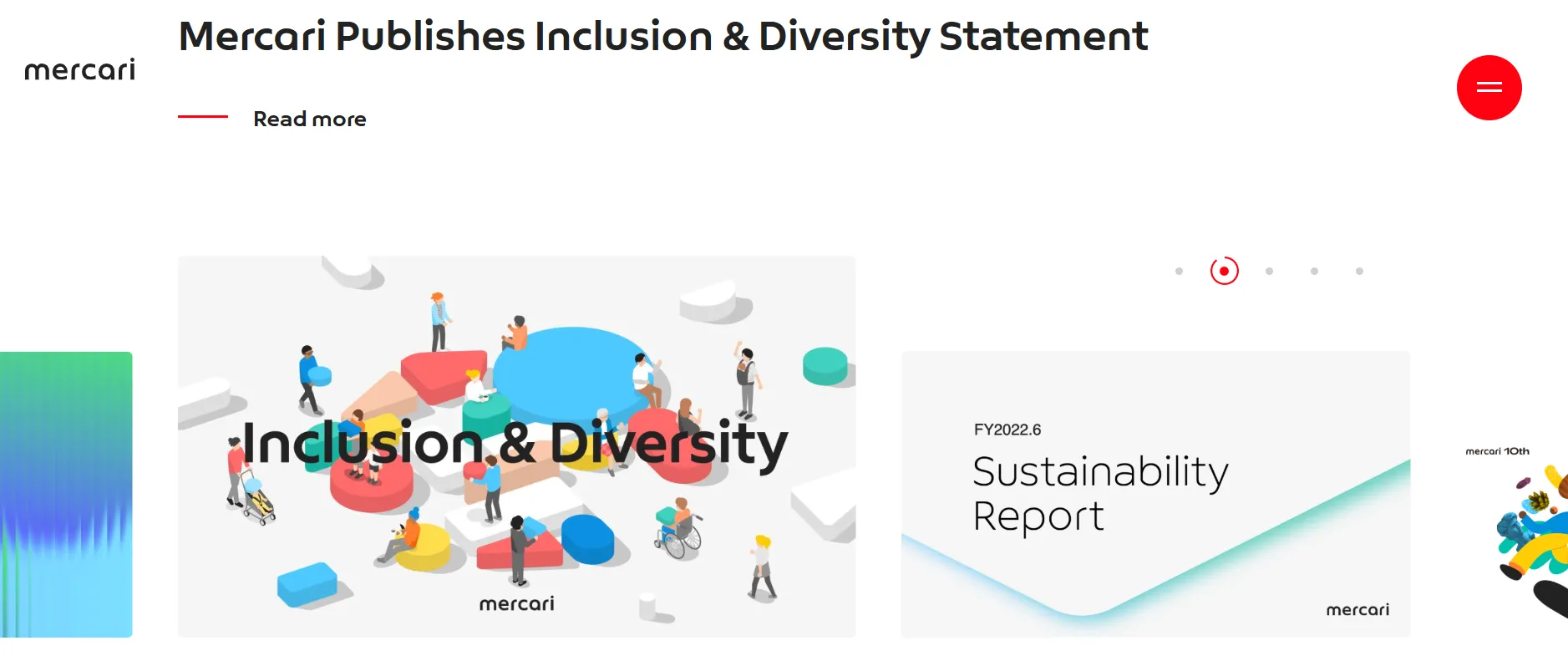
Under the mission of “creating a global marketplace that generates new value” Mercari is developing services with global expansion in mind and actively hiring foreign engineers.
LY Corporation

Since LINE has many users in East Asia and Southeast Asia, they hire many engineers from these regions.
They have strengths in multilingual service development and localization, with environments established for service expansion adapted to each country’s culture.
■日本でエンジニアとしてキャリアアップしたい方へ
海外エンジニア転職支援サービス『 Bloomtech Career 』にご相談ください。「英語OK」「ビザサポートあり」「高年収企業」など、外国人エンジニア向けの求人を多数掲載。専任のキャリアアドバイザーが、あなたのスキル・希望に合った最適な日本企業をご紹介します。
▼簡単・無料!30秒で登録完了!まずはお気軽にご連絡ください!
Bloomtech Careerに無料相談してみる
3. Company Ranking for Foreign Engineers by Salary

For foreign engineers working in Japan, salary is one of the important factors.
Especially when involving relocation from overseas, it’s crucial to choose companies that provide appropriate compensation considering living costs and future savings.
Here, we introduce our original ranking considering factors such as average salaries for foreign engineers.
Top 10 Company Ranking by Average Salary for Foreign Engineers
*Salary-based rankings are guidelines and can vary greatly depending on skills, positions at each company, and hiring conditions.
| Rank | Company Name | Average Salary | Compensation Features |
|---|---|---|---|
| 1 | Google LLC | ¥17,000,000+ | Base salary + bonus + stock compensation, quarterly performance evaluations |
| 2 | Microsoft Japan Co., Ltd. | ¥12,700,000+ | Competitive base salary, RSU (Restricted Stock Unit) grants |
| 3 | Indeed Japan K.K. | ¥10,050,000+ | Semi-annual bonuses, remote work support, comprehensive benefits |
| 4 | Amazon Japan G.K. | ¥9,460,000+ | Large sign-on bonuses for first 2 years, stock compensation thereafter |
| 5 | Mercari, Inc. | ¥8,900,000+ | Stock options, performance-based bonuses |
| 6 | Accenture Japan Ltd. | ¥8,600,000+ | Global-standard compensation system, skill certification-based salary increases |
| 7 | SoftBank Group Corp. | ¥8,300,000+ | Performance-linked bonuses, special allowances for technology areas |
| 8 | Rakuten Group, Inc. | ¥7,000,000+ | Globally unified evaluation system, career advancement in English environment |
| 9 | LY Corporation | ¥6,900,000+ | Semi-annual bonuses, incentive systems |
| 10 | Cybozu Inc. | ¥6,000,000+ | Discretionary work system, remote work, self-reporting evaluation system |
Reference: openwork
Foreign engineer salaries tend to be topped by foreign-affiliated IT companies.
Global tech companies’ Japanese subsidiaries, particularly Google and Microsoft, adopt compensation systems close to global standards, with attractive total compensation packages including performance-linked bonuses and stock compensation in addition to base salaries.
Among Japanese companies, those expanding globally provide relatively high salaries. Mercari in particular has adopted Silicon Valley-style compensation systems, featuring flexible compensation schemes such as stock options and performance-linked bonuses based on results.
■ Related Reading
The following article provides detailed explanations of software engineer salaries in Japan, including average annual income and market trends.
4. Company Ranking with Comprehensive Support for Foreign Engineers – Visa Support

For foreign engineers working in Japan, obtaining and renewing visas (residence status) is one of the most important challenges.
Especially for those working in Japan for the first time, handling the complex visa application procedures independently would be difficult. Here, we introduce companies with comprehensive visa support and living assistance for foreign engineers.
Top 10 Japanese IT Companies with Excellent Work Visa Acquisition Support
| Rank | Company Name | Visa Support Content | Housing Support | Language/Cultural Support | Family Support |
|---|---|---|---|---|---|
| 1 | Rakuten Group, Inc. | Application agency by specialized team, support for switching to highly skilled professional visa, permanent residency acquisition support | Company housing system, relocation expense coverage, initial cost advance | Japanese language training, Japanese culture training, English environment | Spouse/children visa acquisition support, international school fee subsidies |
| 2 | Mercari, Inc. | Full company-funded visa procedures, coordination with administrative scriveners, permanent residency acquisition roadmap provision | Housing arrangement service, rent subsidies, temporary accommodation facilities | Free Japanese lessons, bilingual buddy system | Family visa procedure support, medical interpretation services |
| 3 | Google LLC | Global relocation support team, highly skilled professional visa acquisition support, expatriate system | Housing search agency, full initial cost coverage, short-term accommodation facilities | Japanese/English classes, cultural adaptation programs | Family visa acquisition/renewal support, school search assistance |
| 4 | CyberAgent, Inc. | Visa acquisition support from before joining, application document translation, residence period renewal support | Company housing system, rent subsidies, real estate company introductions | Japanese language training, in-house interpretation, English-capable departments | Spouse visa support, children’s education consultation |
| 5 | LY Corporation | Visa applications linked with joining procedures, renewal timing notification system, permanent residency acquisition advice | Short-term accommodation facilities, rent subsidies, relocation expense coverage | Japanese language classes, mentor system, multilingual support | Family medical insurance, children’s education consulting |
| 6 | Microsoft Japan Co., Ltd. | Individual visa consulting by specialists, support for achieving highly skilled professional requirements | Housing arrangement support, initial cost subsidies | Language training programs, cross-cultural understanding workshops | Family life setup support, education consulting |
| 7 | Recruit Holdings Co., Ltd. | Full visa application cost coverage, residence status consulting, administrative scrivener introductions | Company housing system, rent subsidies, housing search support | Japanese language classes, Japanese culture experience events | Spouse visa/employment support, education consultation |
| 8 | SoftBank Group Corp. | Visa application agency, support for utilizing highly skilled talent certification system, residence card procedures | Housing information provision, rent subsidies, relocation expense subsidies | Japanese language education, living support help desk | Family medical consultation, school information provision |
| 9 | Amazon Japan G.K. | Support by visa specialized team, global relocation program | Temporary housing provision, housing search assistant | Cross-cultural training, language classes, mentor system | Spouse employment support, education consulting |
| 10 | DeNA Co., Ltd. | Visa application agency, application document translation, residence status change support | Housing information provision, initial cost subsidies | Japanese language classes, cultural exchange events | Family visa support, life setup assistance |
What these companies have in common is not just supporting visa application procedures, but having comprehensive support systems for overall life in Japan.
In particular, support for overcoming language barriers and cultural differences, and systems supporting the entire family’s life are well-developed.
■ Related Reading
The following article provides detailed explanations about obtaining work visas for Japan.
■日本でエンジニアとしてキャリアアップしたい方へ
海外エンジニア転職支援サービス『 Bloomtech Career 』にご相談ください。「英語OK」「ビザサポートあり」「高年収企業」など、外国人エンジニア向けの求人を多数掲載。専任のキャリアアドバイザーが、あなたのスキル・希望に合った最適な日本企業をご紹介します。
▼簡単・無料!30秒で登録完了!まずはお気軽にご連絡ください!
Bloomtech Careerに無料相談してみる
5. Characteristics of Companies Popular with Foreign Engineers

Companies attractive to foreign engineers working in Japan share several common characteristics.
Here, we explain in detail the characteristics of companies that receive high evaluations from foreign personnel. Understanding these characteristics will provide clues for finding companies that offer work environments suited to you.
Providing Career Paths Leading to Highly Skilled Professional Visa Acquisition
For foreign engineers, acquiring a “highly skilled professional visa” is an important step in long-term career development in Japan.
This visa has many preferential measures compared to regular work visas, with advantages of longer residence periods and broader activity scope.
Popular companies provide career paths that enable high scores in the highly skilled professional visa point system (point evaluation based on education, work experience, annual income, etc.).
Examples include salary considerations, assignment to positions that receive point additions such as R&D roles, support for patent acquisition and paper publication, and training provision for Japanese language skill improvement.
Companies like Rakuten and Mercari propose career plans with highly skilled professional visa acquisition in mind from the time of joining and provide advice to systematically meet the conditions necessary for point acquisition.
Reference: Immigration Services Agency: Highly Skilled Professionals
Supporting Long-term Career Plans with Permanent Residency in Mind
Engineers who acquire highly skilled professional visas can apply for permanent residency in as little as one year, so companies that provide long-term career paths with permanent residency acquisition in mind receive high evaluations.
Advanced companies provide support such as career plan formulation aligned with permanent residency application timing for foreign employees, assistance with document preparation necessary for permanent residency applications, advice for meeting “good conduct requirements” (tax payment, social insurance enrollment, etc.), and consultation on long-term career vision including post-permanent residency.
One global company provides systematic career development programs enabling excellent foreign engineers to acquire permanent residency and work long-term in Japan under the policy of “localization of global talent”
Comprehensive Tax Benefits and Subsidies for Foreign Personnel
The Japanese government has established various tax preferential measures to promote acceptance of “highly skilled foreign talent”
Companies that actively utilize these systems and work to reduce tax burdens for foreign engineers receive high evaluations.
Representative tax preferential measures include
- Income tax preferential system for highly skilled foreign talent (excluding certain overseas asset income from taxation)
- Exemption from overseas property report submission
- Non-taxable treatment of relocation expenses
- Tax reduction measures for housing acquisition
Advanced companies support foreign employees in maximizing tax benefits by holding seminars by tax accountants and providing individual tax consultation services.
Many companies also provide English document preparation support during tax return season.
Reference: Immigration Services Agency: Preferential Measures
Well-established English Environment
For foreign engineers with concerns about Japanese language ability, the English usage environment within companies is an extremely important factor.
Popular companies implement initiatives such as setting English as the official company language (Rakuten, Mercari, etc.), handling important meetings and documents in English (Google, Microsoft, Amazon, etc.), introducing bilingual mentor and buddy systems, establishing bilingual English-Japanese environments, and providing simultaneous interpretation services.
Rakuten Group is particularly known for starting “Englishnization” in 2010, making English the official company language. Mercari and LINE also focus on establishing multilingual environments and creating environments where abilities can be demonstrated regardless of language.
Global Evaluation Systems Not Bound by Seniority
Japan’s traditional seniority-based evaluation systems can feel like career development barriers for foreign engineers.
Popular companies adopt skill and result-based evaluations, promotion systems not dependent on age or length of service, regular performance reviews, transparent evaluation criteria, and globally common evaluation frameworks.
For example, Google Japan conducts quarterly performance reviews and evaluates based on goal achievement levels.
Microsoft and CyberAgent have established multifaceted evaluation criteria including leadership and innovation abilities, creating systems where foreign engineers are evaluated fairly.
Supporting Life Infrastructure Setup Including Family Visas and Social Insurance
For foreign engineers, especially those coming to Japan with families, establishing life infrastructure becomes an important issue.
Popular companies provide family visa acquisition support, housing search and contract procedure support, bank account opening and mobile phone contract support, children’s school search and enrollment procedure assistance, medical institution referrals and hospital visit accompaniment services, and explanation and procedure support for Japan’s social insurance systems.
Companies with comprehensive systems supporting entire family life receive particularly high evaluations.
For example, Google has specialized relocation teams that fully support family life setup, while Rakuten provides children’s international school fee subsidies and family medical insurance.
6. Fields Where Foreign Engineers Can Excel by Industry

Japan’s IT industry comprises diverse fields, and foreign engineers can demonstrate different strengths in each field.
Here, we introduce five major fields where foreign engineers can particularly excel, including required skills and roles.
Roles of Foreign Engineers in Globally Expanding SIer Companies
System integration companies (SIers) are companies that design, develop, and operate business systems for client companies.
Demand for foreign engineers is particularly growing in SIers with global expansion.
Main roles required of foreign engineers
- Communication bridge roles with overseas bases
- Multilingual support in global projects
- Providing insights about home country markets
- Strengthening coordination with offshore development bases, etc.
SIer companies tend to provide stable employment and systematic career paths, making them suitable for foreign engineers seeking long-term career development.
Large SIers particularly have well-developed training systems with abundant opportunities for technical skill improvement.
Strengths of Foreign Personnel Valued in Startup/Venture Companies
Japan’s startup/venture companies are experiencing rapid growth and conducting business development with global expansion in mind.
In such companies, foreign engineers with diverse perspectives and global mindsets are highly valued.
Main strengths of foreign engineers
- Product development perspectives with global markets in mind
- Knowledge of latest methodologies like agile development and lean startup
- Networks with overseas startup ecosystems
- Creative problem-solving approaches from diverse cultural backgrounds, etc.
Startup companies often adopt merit-based evaluation systems rather than seniority, enabling early career growth based on ability.
The ability to engage in wide-ranging work also allows acquisition of diverse skills.
Bilingual Skills Required at Japanese Offices of Foreign IT Companies
At Japanese offices of foreign IT companies, bilingual personnel who can bridge global headquarters and the Japanese market are highly valued.
Foreign engineers can play important roles utilizing language skills and technical capabilities.
Main roles required of foreign engineers
- Technical communication between headquarters and Japanese offices
- Localization of global products for the Japanese market
- Conveying Japan-specific requirements to headquarters development teams
- Technical support and customer success, etc.
Foreign IT companies generally have high salary levels and are advantageous for building global careers.
There are also many opportunities to work with cutting-edge technology, providing favorable environments for technical skill improvement.
Companies Where Foreign Engineers Can Utilize Expertise in R&D and AI Fields
R&D and AI fields are areas where global talent acquisition competition is particularly intense. Japanese companies are also focusing on hiring excellent researchers and engineers, with abundant opportunities to utilize expertise.
Areas where foreign engineer expertise can be utilized
- Machine learning and deep learning R&D
- Specialized fields like natural language processing and image recognition
- Data science and advanced analytics
- Industry-academia collaboration research projects, etc.
In R&D and AI fields, highly specialized engineers are highly valued and often receive competitive compensation packages.
There are also abundant opportunities for international research community exchange and paper publication.
International Project Examples in Fintech and Blockchain Fields
Fintech and blockchain technologies, by nature enabling cross-border transactions and payments, require foreign engineers with international perspectives to play important roles.
These fields are rapidly developing in Japan as well, expanding opportunities for foreign engineers to be active.
International project examples
- International remittance system development and implementation
- Cross-border payment platform construction
- Multi-currency cryptocurrency exchange development
- International supply chain management using blockchain, etc.
Fintech and blockchain fields are relatively new areas, so there’s potential to reach leadership positions early based on ability.
Since global perspectives are particularly valued, these fields offer environments where foreign engineers can maximize their strengths.
7. Regional Ranking of Popular Work Locations for Foreign Engineers

For foreign engineers working in Japan, choosing work locations is as important as job content.
Work location significantly affects living costs, community environment, career opportunities, and quality of life. Here, we introduce popular work locations for foreign engineers in ranking format and explain each area’s characteristics.
1st Place: Tokyo Metropolitan Area – IT Company Concentration Area with Well-developed Foreign Personnel Communities
Tokyo is Japan’s largest IT company concentration area and the city where the most foreign engineers work.
The following areas are particularly well-developed in terms of both IT companies and foreign personnel communities.
Tokyo’s Major IT Company Concentration Areas
Shibuya/Ebisu Area – Diverse IT companies from startups to global enterprises concentrated. “Bit Valley” where Google, Amazon, Mercari and others have bases.
Roppongi/Akasaka Area – Many foreign-affiliated companies with internationally diverse environments.
Marunouchi/Otemachi Area – Concentration of major SIers and financial tech companies.
Shinagawa/Tamachi Area – Gathering of Japanese subsidiaries of foreign tech companies like Microsoft and Salesforce.
Tokyo’s strengths include overwhelming job numbers and diverse career options, well-developed communities, international educational institutions, multilingual medical facilities and administrative services, and diverse food culture with internationally rich living environments.
On the other hand, challenges include high housing costs, rush hour commuting and long commute times, and generally high living costs.
In Tokyo, engineer average annual salaries are around 6-12 million yen, high by Japanese standards, but living costs are also high, so income-expense balance needs consideration especially for families.
However, from the perspective of international career building and network formation, this is the region with the most abundant opportunities.
2nd Place: Osaka/Nagoya – Regional Cities with Excellent Living Cost and Salary Balance
The major cities of Osaka and Nagoya, following Tokyo, are attractive for maintaining relatively high salary levels while having somewhat lower living costs than Tokyo.
IT Industry Characteristics of Osaka/Nagoya
Osaka – Kansai region IT industry concentration area (Gran Front Osaka, etc.), many EC-related companies and game development companies, advancing startup ecosystem formation.
Nagoya – Manufacturing DX-related companies and supply chain technology development companies, IoT and embedded system development in collaboration with automotive industry, IT company concentration related to Toyota Group.
Strengths of Osaka/Nagoya include lower rent compared to Tokyo, shorter commute times and higher quality of life, lower overall living costs including food and dining expenses, and warm regional communities.
However, challenges include fewer job opportunities compared to Tokyo, limited companies with English environments, and fewer international educational and medical infrastructure options.
Engineer average annual salaries in Osaka/Nagoya are slightly lower than Tokyo, but considering living cost balance, disposable income can be equivalent or higher.
These are particularly attractive options for foreign engineers prioritizing family relocation or quality of life.
3rd Place: Fukuoka/Sapporo – Emerging IT Industry Regions Seeking Foreign Personnel for Regional Revitalization
Fukuoka and Sapporo have recently been focusing on IT industry attraction and development as part of regional revitalization, attracting attention as regions with new possibilities for foreign engineers.
IT Industry Characteristics of Fukuoka/Sapporo
Fukuoka – Advocating as a “startup city” with comprehensive entrepreneurship support systems, startup support facilities like city-operated “Fukuoka Growth Next,” bases of major IT companies like LINE Fukuoka Office, international expansion utilizing connections with Asian countries.
Sapporo – Concentration of game development companies and independent software companies, talent development programs like “Sapporo City AI Business Creation Human Resource Development Project,” migration promotion combining remote work, internationality as Winter Olympics host city.
Strengths of Fukuoka/Sapporo include affordable housing costs, good balance of natural environment and urban functions, comprehensive support programs by local governments, and attractions like unique food culture and seasonal events.
However, challenges include limited global company bases, fewer career advancement options compared to Tokyo, and constraints in overseas access due to limited direct international flights.
Engineer average annual salaries in Fukuoka/Sapporo are lower than Tokyo, but low living costs enable comfortable lifestyles.
These are particularly suitable options for foreign engineers prioritizing work-life balance or wanting to live in natural environments.
Remote Work Support: Global Teams Accessible from Regional Areas
Due to the COVID-19 impact, IT companies adopting full remote work or hybrid work have increased.
This has expanded possibilities for high-paying jobs without living in major cities like Tokyo.
Remote Work Benefits
- Freedom to choose where to live (living cost optimization possible)
- No commute time, easier to secure work-life balance
- Flexible response to family circumstances (spouse transfers, children’s education, etc.)
- Ability to work while living in attractive regions throughout Japan, etc.
Remote Work Disadvantages
- Limited face-to-face opportunities for career development and relationship building
- Time difference and communication barriers (especially in Japanese language environments)
- Need to secure home environments suitable for remote work
- Attention needed for “work location” handling in visa applications, etc.
When choosing remote work-centered working styles, it’s possible to earn Tokyo-level salaries (around 7-10 million yen) while living high-quality, low-cost lives in regional areas.
Foreign IT engineers relocating to naturally blessed areas like Okinawa, Karuizawa, and Shonan are particularly increasing.
Especially for first-time workers in Japan, a common approach is to start careers in major cities like Tokyo, become accustomed to Japanese life and business culture, then consider relocation to other regions.
8. Success Stories: Career Stories of Foreign IT Engineers Active in Japan

We introduce real career stories of foreign IT engineers who have achieved success in Japan.
From these cases, you can gain hints for overcoming language barriers and cultural differences to build careers in Japan.
First Year: New Graduate Foreign Engineer’s Experience Overcoming Language Barriers
Michael Chen (pseudonym) / 28 years old / From China / Web Engineer
Michael majored in computer science at a Beijing university. In his fourth year, he participated in a Japanese job fair, applied to Rakuten’s global recruitment program, and received a job offer.
Challenges faced
- JLPT N3 level Japanese ability had limitations for work communication
- Difficulty understanding specifications due to unknown Japanese technical terminology
- Felt isolated unable to keep up with team drinking parties and casual conversations
- Difficulty adapting to Japan-specific “implicit understanding” and “report-contact-consult” culture
Overcoming these challenges
- Rakuten’s “Englishnization” program enabled English communication for work
- Japanese “buddy” provided support for work and life aspects
- Created weekly “international exchange lunch” within team to learn about each other’s cultures
One year after joining, Michael is now recognized as a front-end development expert within his team. His Japanese ability has improved to N2 level, and he’s gradually being assigned project leadership roles.
Technical Evaluation: Voice of Engineer Demonstrating Leadership in Japanese Companies
Anita Singh (pseudonym) / 35 years old / From India / AI Engineer
After obtaining a master’s degree in computer science from the Indian Institute of Technology (IIT), Anita worked for an Indian IT company for three years, then transferred to a Japanese AI startup.
Anita’s Career Path
- 3 years at Indian IT company as software engineer
- Transferred to Japanese AI startup as machine learning engineer
- 2nd year: Promoted to natural language processing project leader
- 3rd year: Acquired multiple patents and promoted to technical lead
- Currently: Leading next-generation AI product development team
In addition to technical skills, Anita worked on improving communication abilities. While not reaching business-level Japanese, she promoted English use within teams and utilized interpreters for important meetings.
Path to Entrepreneurship: Foreign Engineer Who Became Independent Using Japanese Experience
David Wang (pseudonym) / 42 years old / From USA / Tech Entrepreneur
After majoring in computer science at a US university, David worked at Silicon Valley tech companies. He came to Japan to participate in a major Japanese game company’s global expansion project, then used his 7-year experience at Japanese companies to found a cross-border EC technology startup in Tokyo.
David’s Career Path
- 5 years as software engineer at US tech company
- 3 years in overseas expansion department of Japanese game company
- 4 years as product manager at Japanese IT company
- Founded cross-border EC SaaS platform in Tokyo
- Business expansion centered on Japan and Asian markets, growing to 30 employees
David’s points for successful entrepreneurship in Japan:
- Networks and client base built through work experience at Japanese companies
- Understanding and adaptation to Japan-specific business practices
- Collaboration with Japanese co-founders
- Clear value proposition as “bridge” between Japan and global markets
- Utilization of startup support programs
“As a foreigner starting a business in Japan, the most important thing is building a business model that solves ‘Japan-specific challenges’ Simply bringing globally successful models doesn’t work well. Understanding Japanese market characteristics and customization accordingly is necessary” David says.
9. FAQ: Japanese Employment Q&A for Foreign Engineers

We’ve compiled frequently asked questions and answers from foreign personnel considering engineering employment in Japan.
Please use this as reference if you’re considering job hunting or career changes in Japan.
Can I find employment at companies even if my Japanese isn’t fluent yet?
Q: I’m at JLPT N3 level – do I have chances of getting hired at Japanese IT companies?
A: Yes, there are many companies where employment is possible even with N3-level Japanese.
Points for choosing companies when concerned about Japanese language
- Well-established English environments (English as official company language or bilingual environment, global company Japanese offices with established English environments)
- Choose startups actively hiring foreign personnel (expanding startups with technology-focused hiring, emphasis on expertise in advanced technical fields)
- Choose SIers handling many international projects (departments handling global projects, experience with multinational team development projects)
Actual employment possibilities vary based on factors like technical skills, experience, English ability, and job market conditions.
However, by emphasizing technical skill demonstration, high English ability, and motivation for Japanese language learning, employment chances increase even with developing Japanese language skills.
Reference: Japanese Language Proficiency Test JLPT: Certification Guidelines
Are foreign engineer salaries equivalent to Japanese engineers? Is negotiation possible?
Q: Do foreign engineers receive the same salary levels as Japanese engineers? Can salaries be negotiated?
A: Basically, most Japanese companies have no salary differences based on nationality, with decisions based on skills, experience, and achievements. However, there are the following characteristics:
Salary trends
- Large corporations and global companies generally apply the same salary tables regardless of nationality
- Startup companies often have flexible salary settings according to skills and expertise
- Foreign-affiliated companies may offer higher salaries than Japanese with compensation systems closer to global standards
Cases where foreign engineers tend to receive higher compensation
- Rare specialized skills (AI, blockchain, cloud security, etc.)
- Language skills and cultural knowledge essential for global expansion
- Experience and achievements in overseas markets
Generally, foreign-affiliated companies and startups have greater room for salary negotiation, while traditional Japanese companies often have fixed salary tables.
During job changes, 20-30% increases from previous positions are typical, but 50%+ increases are possible depending on skill sets.
How to Find Companies to Apply to Without Japanese Work Experience
Q: As an overseas resident without Japanese work experience, how can I apply to Japanese companies?
A: Even without Japanese work experience, you can proceed with job hunting at Japanese companies through the following methods:
Utilizing platforms specialized in foreign engineer recruitment
- Japan Dev (platform specialized in English-applicable Japanese IT jobs)
- Daijob (job site for bilingual personnel)
- LinkedIn Japan (many foreign-affiliated and international Japanese company jobs posted)
- TokyoDev (introducing English-environment jobs at Tokyo tech companies)
- Jobs in Japan (wide range of English-applicable jobs posted)
Using specialized agent services
- Robert Walters (global agent with strengths in Japanese employment for foreign technical personnel)
- Michael Page (recruitment company strong in IT/technology fields)
- JapanWork (agent specialized in foreign personnel seeking Japanese employment)
10. Understanding Work Styles from Foreign Engineer Employment Rankings in Japan
Japan’s IT industry offers great opportunities for foreign engineers due to globalization and talent shortages.
While language and cultural barriers exist, fulfilling careers can be built through appropriate company selection and preparation.
By honing technical skills, continuing Japanese language learning, and leveraging your country’s strengths, you too can succeed in Japan.
We hope this article assists in your career development.
■ Related Reading
The following articles introduce Japanese company interview preparation and resume/CV writing methods.

